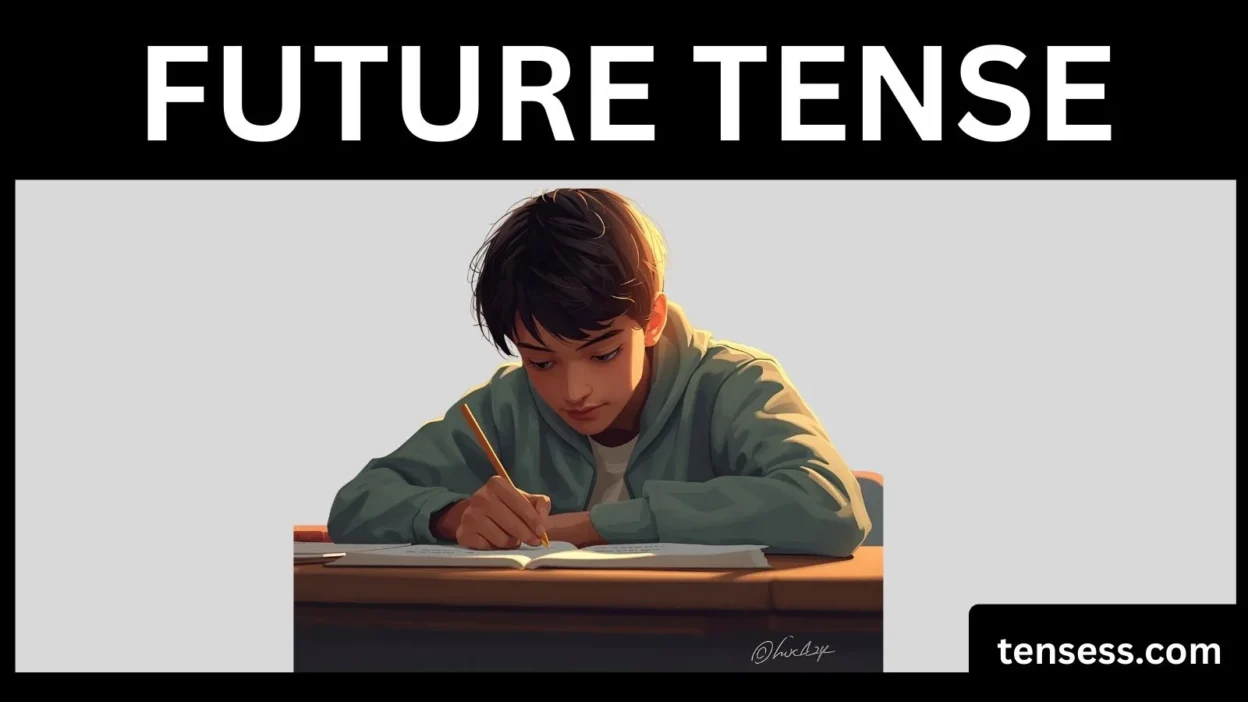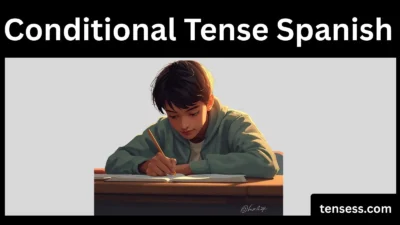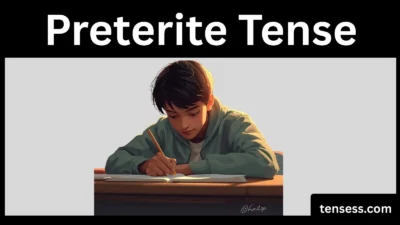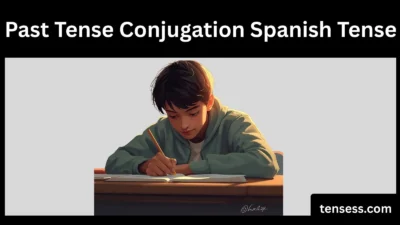The future tense is an essential part of English grammar, allowing us to talk about actions or events that will happen later.
if you’re a student, language learner, writer, or grammar enthusiast, understanding how to use the future tense correctly can elevate your communication skills.
This tense helps express predictions, plans, intentions, or scheduled events, like saying, “I will read a book tomorrow.”
In this SEO-optimized guide, we’ll break down the future tense with clear explanations, practical examples, and tips to make it beginner-friendly.
From verb conjugation to common mistakes, we’ve got you covered.
By the end, you’ll feel confident using the future tense in everyday conversations or writing.
Let’s dive into the definition, structure, and examples to help you master this versatile tense!
What Is the “Future” Tense of “Read”?
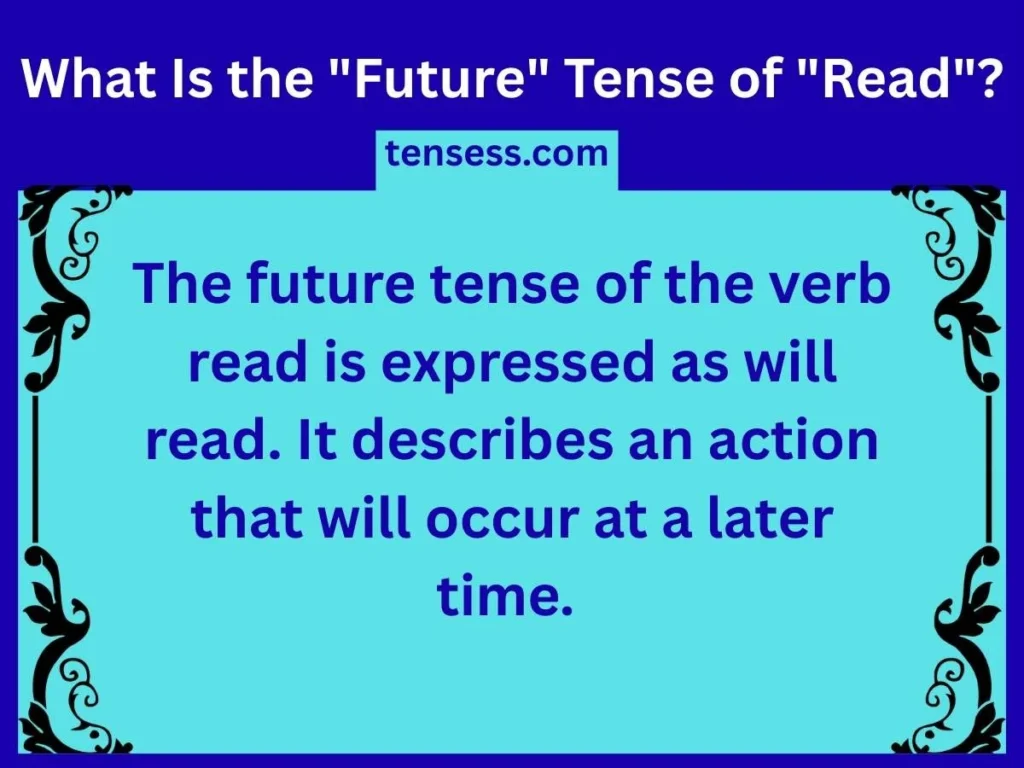
For example, “I will read a novel next week” indicates a future plan to read.
Recognition of Future Tense of Read
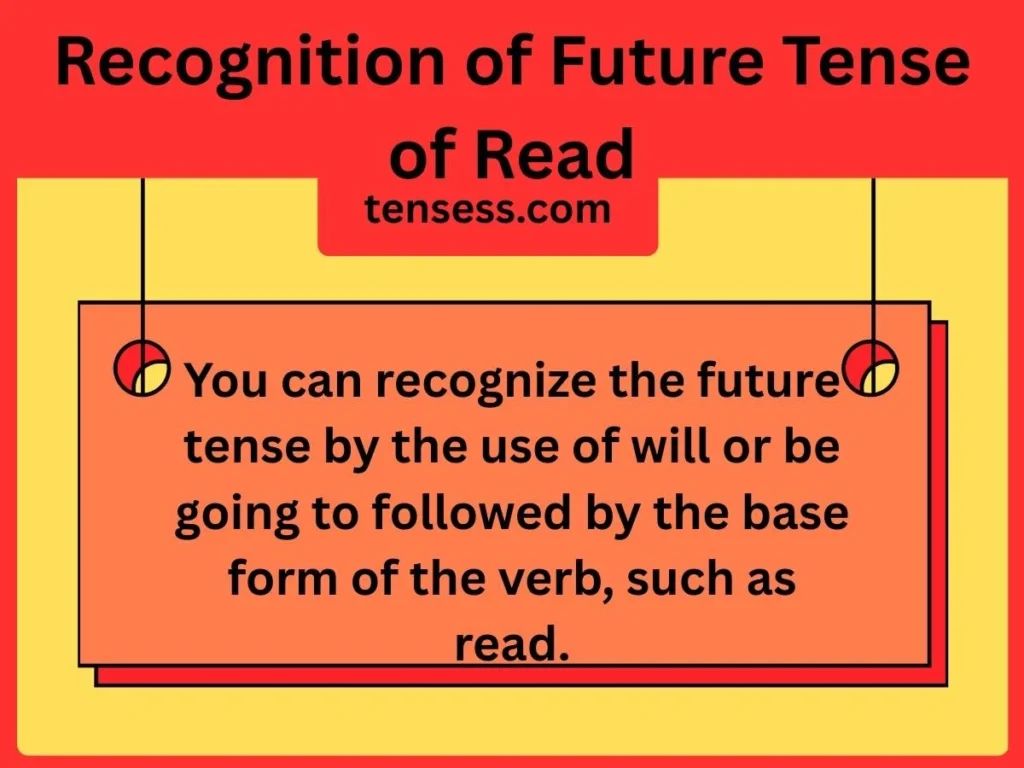
It’s often used for predictions (“It will rain”), intentions (“I will read”), or scheduled events (“The train will leave at 6 PM”).
Structure of Sentence in Future Tense
The basic structure for future tense sentences is:
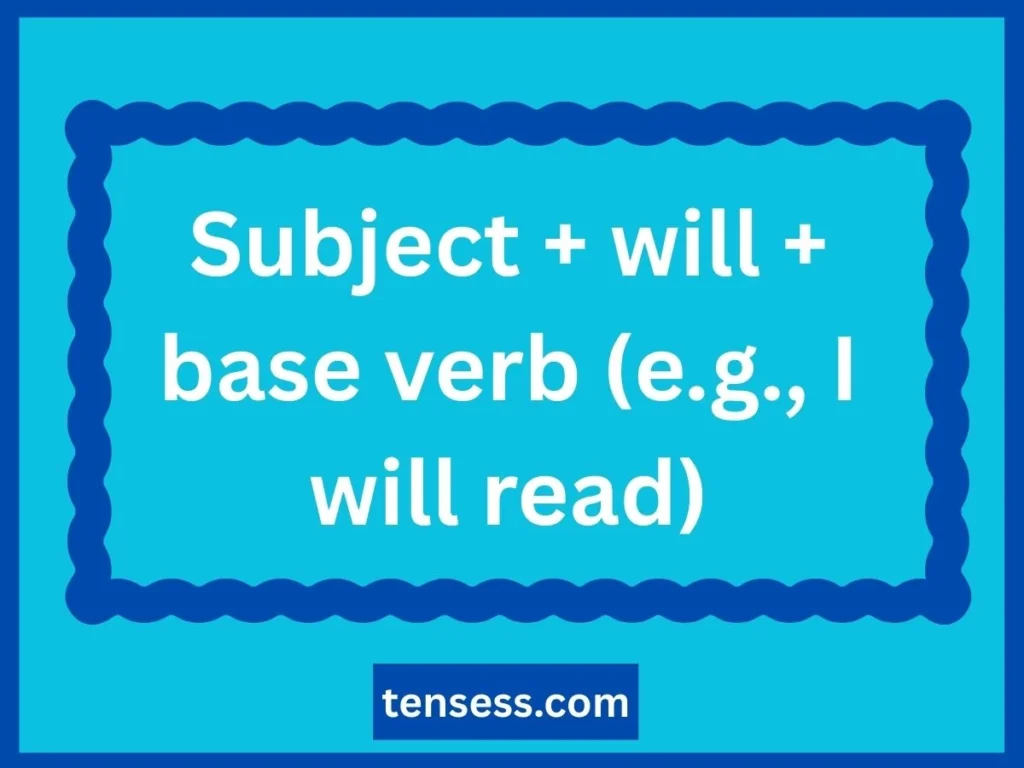
- Subject + am/is/are + going to + base verb (e.g., She is going to read).
Formation of Future Tense
To form the future tense:
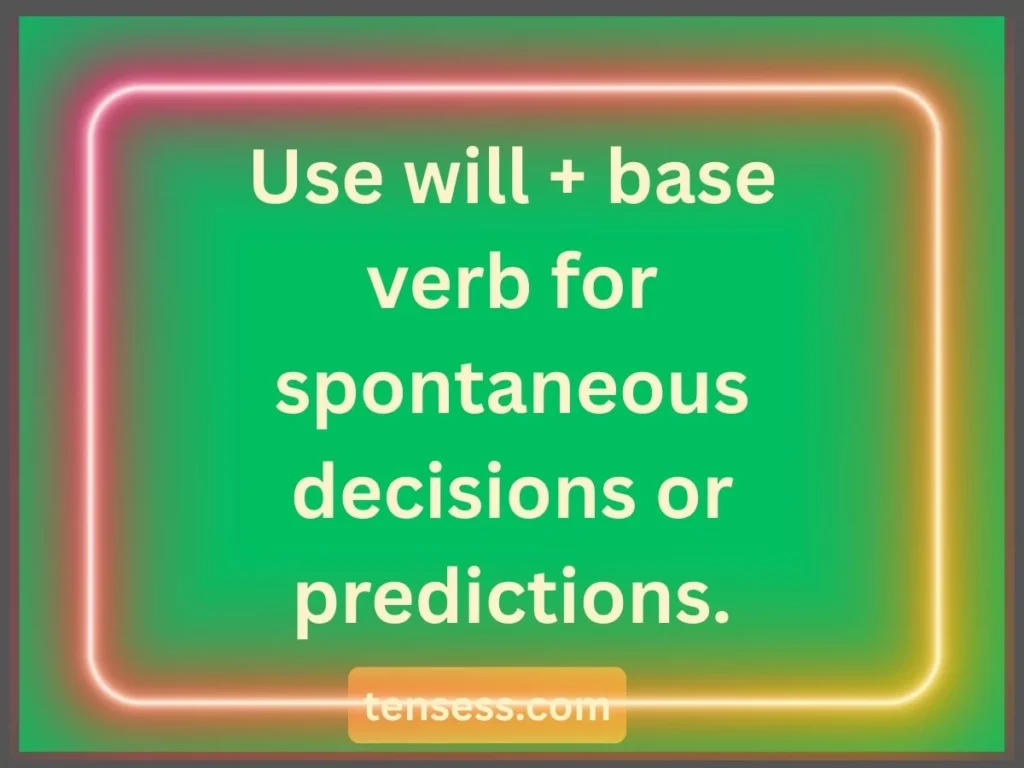
- Use am/is/are + going to + base verb for planned actions or strong predictions based on evidence.
Verbs
The verb read in the future tense remains in its base form (read), pronounced /ri:d/, regardless of the subject.
Helping Verbs
The helping verbs for the future tense are:
- Will: Used for all subjects (I, you, he, she, it, we, they).
- Be going to: Uses am (I), is (he/she/it), or are (we/you/they).
Define the Verb in That Specific Tense
In the future tense, read (will read) describes the act of reading that will happen later.
Regular or Irregular
The verb read is irregular because its past tense changes to read (pronounced /rɛd/). However, in the future tense, it stays in its base form, read (/ri:d/), making it straightforward to use.
10 Simple Sentence Examples
- I will read a book tomorrow.
- She will read the newspaper later.
- We will read the instructions carefully.
- He is going to read a novel tonight.
- They will read the report next week.
- You are going to read the email soon.
- It will read the data automatically.
- John will read the poem aloud.
- The team is going to read the feedback.
- Sarah will read her lines for the play.
How to Conjugate “Future” Tense
Conjugating read in the future tense is simple because the base verb read doesn’t change across subjects. Here’s how it works:
- Use will + read for all subjects in simple predictions or decisions.
- Use am/is/are + going to + read for planned actions.
- No additional endings are added to read.
- Ensure the correct form of be (am/is/are) for going to constructions.
- Use will consistently for spontaneous or uncertain future actions.
- Add adverbs like tomorrow or soon to clarify timing.
- For questions, invert will or be with the subject (e.g., Will you read?).
- For negatives, add not after will or be (e.g., I will not read).
- Combine with time expressions for clarity (e.g., next week).
- Practice with different subjects to master conjugation.
Conjugation Table
| Subject | Will Construction | Be Going To Construction |
| I | I will read | I am going to read |
| You | You will read | You are going to read |
| He/She/It | He will read | He is going to read |
| We | We will read | We are going to read |
| They | They will read | They are going to read |
Spelling Changes or Irregularities
There are no spelling changes for read in the future tense since it uses the base form. The irregularity of read (past tense: read /rɛd/) does not affect its future tense usage.
Examples of “Future” Tense Sentences
Here are 10 varied future tense examples with different subjects:
- I will read a mystery novel this weekend.
- You are going to read the guide before the trip.
- He will read the contract carefully.
- She is going to read her favorite book again.
- It will read the code in seconds.
- We will read the reviews before deciding.
- They are going to read the article tonight.
- John will read the speech at the event.
- The students will read the chapter tomorrow.
- Sarah is going to read the email before replying.
Common Mistakes with “Future” Tense
Here are frequent errors and how to avoid them:
- Using present tense for future: Saying “I read tomorrow” instead of I will read tomorrow. Always use will or be going to for future actions.
- Wrong form of “be”: Using is instead of are (e.g., “They is going to read”). Match am/is/are to the subject.
- Omitting “will” in questions: Saying “You read tomorrow?” instead of Will you read tomorrow? Invert will and the subject.
- Confusing “will” and “going to”: Using will for planned actions (e.g., “I will read tonight” for a fixed plan). Use be going to for plans.
- Adding -s to the verb: Saying “She will reads” instead of She will read. Keep the base verb unchanged.
- Misplacing “not”: Saying “I not will read” instead of I will not read. Place not after will.
- Forgetting time markers: Omitting words like tomorrow can make sentences vague. Include time expressions.
- Overusing “will”: Repeating will unnecessarily in lists (e.g., “I will read, will write”). Use will once if the subject is the same.
- Ignoring context: Using will for strong predictions (e.g., “It will rain” when evidence suggests be going to). Match the structure to intent.
- Incorrect contractions: Saying “I’ll going to read” instead of I’m going to read. Use I’ll for will and I’m for am.
Related Verbs and Synonyms for “Future” Tense
The future tense applies to all verbs, but some are commonly confused:
- Predict: Often used like will for forecasts (e.g., “It will rain” vs. “I predict rain”).
- Plan: Similar to be going to for intentions (e.g., “I am going to read” vs. “I plan to read”).
- Intend: Indicates purpose, like be going to (e.g., “I intend to read”).
- Expect: Used for assumptions about the future (e.g., “I expect to read”).
- Hope: Expresses desire for future actions (e.g., “I hope to read”).
- Shall: A formal alternative to will (e.g., “We shall read”). Rarely used today.
- Anticipate: Similar to expect (e.g., “I anticipate reading”).
- Foresee: Like predict (e.g., “I foresee reading”).
- Schedule: Implies planned events (e.g., “I scheduled reading time”).
- Aim: Similar to intend (e.g., “I aim to read”).
Sentence Comparisons
- Will vs. Be going to: “I will read if I have time” (spontaneous) vs. “I am going to read tonight” (planned).
- Will vs. Plan: “I will read tomorrow” vs. “I plan to read tomorrow” (more formal).
Tips to Practice Using “Future” Tense
- Write 5 daily plans using be going to (e.g., “I am going to read a book”).
- Make predictions about the week using will (e.g., “It will rain”).
- Practice questions like Will you read this?
- Use a journal to write future tense sentences daily.
- Read books and highlight future tense examples.
- Speak plans aloud to practice pronunciation (e.g., I’ll read).
- Use apps like Duolingo for future tense exercises.
- Create flashcards with will and be going to sentences.
- Correct incorrect sentences to spot errors.
- Discuss future plans with a friend using future tense.
Frequently Asked Questions
- What’s the difference between “will” and “be going to”?
Will is for spontaneous decisions or predictions; be going to is for plans or evidence-based predictions. - Can “shall” be used instead of “will”?
Yes, but shall is formal and rare in modern English. - Is the future tense always about the distant future?
No, it can refer to any future time, like “I will read in an hour.” - Do all verbs conjugate the same in future tense?
Yes, all verbs use the base form with will or be going to. - Can I use present tense for future events?
Yes, for scheduled events (e.g., “The train leaves tomorrow”). - How do I make negative future tense sentences?
Add not after will or be (e.g., “I will not read”). - What’s a common mistake with future tense?
Adding -s to the verb (e.g., “She will reads” is wrong). - Can I combine “will” and “going to”?
No, use one or the other for clarity. - Are there irregular verbs in future tense?
No, the base verb stays the same for all. - How do I practice future tense?
Write plans, predict events, or use grammar apps.
Exercises
- Write 5 sentences using will read.
- Write 5 sentences using be going to read.
- Convert 3 present tense sentences to future tense.
- Create 3 questions using will.
- Make 3 negative future tense sentences.
- Correct 3 incorrect future tense sentences.
- Write a short paragraph about your plans using be going to.
- Predict the weather for tomorrow using will.
- Combine will and be going to in a dialogue.
- Rewrite a past tense story in future tense.
Quizzes
- What is the correct form: “I ___ read tomorrow”?
a) will b) am c) is
Answer: a) will - Which is correct?
a) She will reads b) She will read
Answer: b) She will read - What’s wrong: “They is going to read”?
Answer: Use are for “they.” - True/False: Shall is common in modern English.
Answer: False - Fill in: “We ___ going to read tonight.”
Answer: are - Correct: “I not will read.”
Answer: I will not read. - Which is a plan?
a) I will read if I can b) I am going to read tonight
Answer: b - What’s the helping verb for “he”?
a) am b) is c) are
Answer: b) is - True/False: Read changes spelling in future tense.
Answer: False - Write a future tense sentence.
Example Answer: I will read a book.
Conclusion
Mastering the future tense is a game-changer for clear communication, whether you’re planning, predicting, or scheduling.
By understanding how to use will and be going to, conjugating verbs like read, and avoiding common mistakes, you’re well on your way to grammar confidence.
Practice with the exercises and quizzes provided, and try crafting your own future tense sentences in daily conversations or writing.
For extra help, consider using a grammar checker like Grammarly to polish your skills. Keep exploring verb tense examples and conjugation patterns to solidify your knowledge.
Ready to take the next step? Write 10 future tense sentences today or share your examples in the comments below to get feedback!
